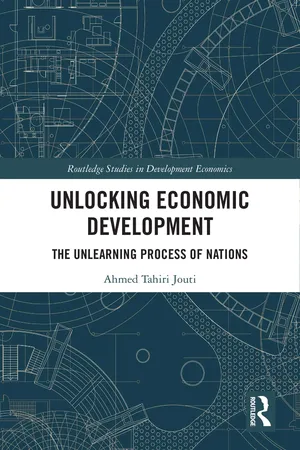
Unlocking Economic Development
The Unlearning Process of Nations
Ahmed Tahiri Jouti
- 162 pages
- English
- ePUB (mobile friendly)
- Available on iOS & Android
Unlocking Economic Development
The Unlearning Process of Nations
Ahmed Tahiri Jouti
About This Book
Despite the abundant literature about development policies and solutions, many developing countries continue to struggle with basic development issues. The author of this book argues that such a situation is due to the absence of an unlearning process that would aid in adjusting negative mindsets and outdated mental models that hinder economic development.
This book addresses development issues from the behavioral perspective, linking negative mindsets and behaviors to growth and development strategies and policies. It identifies six mindsets and actions that impede the economic development of underdeveloped nations. Then, it suggests solutions to upgrade the mindsets according to the plans and policies. Moreover, the book highlights the different concepts and phenomena in a straightforward way with simple figures to facilitate their understanding for people who do not necessarily have a background in business or economics. At the same time, it fully respects scientific standards in addressing the topics and themes under discussion. Each chapter identifies the state of mind needed to 'unlearn' with real examples and experiences and offers suggestions to undertake and accomplish the unlearning process.
Based on real and clear-cut examples, the book presents the main beliefs and psychological mechanisms that lead to underperforming behaviors of customers, investors, entrepreneurs and policy makers. Thus, the main audience for the book is scholars, students and researchers in economics and development, as well as policymakers, wishing to attempt new approaches to counteract the boomerang effect.
Frequently asked questions
Table of contents
- Cover
- Half Title
- Series Page
- Title Page
- Copyright Page
- Table of Contents
- List of figures and tables
- Introduction
- 1 The unlearning process of nations
- 2 The comfort zone and the boomerang effect
- 3 The customer experience and the under-investment mania
- 4 The Business As Usual mindset and traditionalism
- 5 The ‘no decision’ or the ‘ostrich’ behaviour
- 6 The short termism culture
- 7 ‘The sky is the limit’ paradigm
- 8 Almost Good – the global scheme of economic under-performance
- Summary
- Index